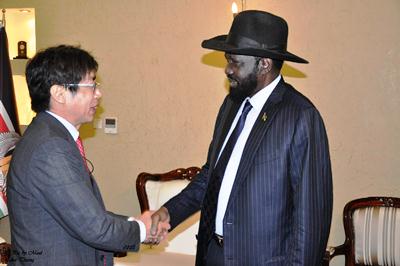Japan envoy urges release of S. Sudan political detainees
July 5, 2017 (JUBA) – The Japanese ambassador in South Sudan, Kiya Masahiko has called for the release of political detainees who are currently being held in connection to the ongoing conflict in the world’s youngest nation.

Masahiko made the call Wednesday after holding talks with South Sudan President on issues of mutual interest, during which he called on the latter to “make concrete steps and ensure that all the people of South Sudan broadly participate, agree and accept its agenda and outcomes to make the national dialogue successful”.
“I came to visit his Excellency the president and to discuss with him issues of mutual interests and to the people of both countries. Japanese government and people hopes to see South Sudanese leaders take “concrete steps” towards achieving peace in the country”, the diplomat told reporters in the capital, Juba.
Wednesday meeting, he further disclosed, mainly centered on issues related to current situation in the war-torn nation, and that he appreciated the move taken by the president when he launched the national dialogue, but needs to be followed by concrete steps.
Masahiko, however, assured the president of Japan’s commitment towards the national dialogue and the peace process, but urged government to improve and provide a conductive environment in terms of commitment of the ceasefire, release of political prisoners, enhancing security and allow free movement of aid agencies.
These measures, he further stressed, would contribute into making National Dialogue an inclusive, transparent and credible.
The envoy also used the occasion to appeal to South Sudan opposition leaders to willingly join the national dialogue process.
Officially launched in May this year, he national dialogue is both a forum and process through which the people South Sudan shall gather to redefine the basis of their unity as it relates to nationhood, redefine citizenship and belonging, as well as restructure the state for national inclusion.
Since mid-December 2013, tens of thousands of people have been killed and over two million displaced in South Sudan’s wort-ever violence outbreak.
(ST)
